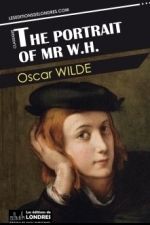Search

The Way of the Brave (Global Search and Rescue, #1)
Book
Former pararescue jumper Orion Starr is haunted by the memory of a rescue gone wrong. He may be...
Chrisitan Miltiary Suspence
Eilidh G Clark (177 KP) rated The Portrait of Mr W.H. in Books
May 14, 2017
. As a paradox to the realism and ethics of the period, decadent writers, artists, and poets challenged a society that strove for a standard in public discourse.
First published in 1889, Oscar Wilde’s The Portrait of Mr W.H., is a short story about the efforts of three characters trying to discover the identity of Shakespeare’s Mr W.H. ; the dedicatee of his many sonnets. Wilde’s novel is a prime example of decadent literature and aestheticism, which, as a result, challenges the Victorian ideals of moral decency and public rectitude. The author uses paradox in the novel to present a theory that contradicts the conservative critics of Shakespeare’s sonnets.
Wilde presents a subjective interpretation of Shakespeare’s sonnets that portrays homoerotic sexual desire as the force for creative inspiration. Foremost, through the character Cyril Graham, the author demonstrates that art is ‘an attempt to realise one’s own personality on some imaginative plane out of reach of the trammelling accidents and limitations of real life’, (Wilde, p.111).
Taking from a hypothesis in the previous century by Edmund Malone and Thomas Tyrwhitt, the character of Cyril forms a theory in which Mr W.H. is a young actor named Willie Hughes, employed by Shakespeare and who is the muse to which the sonnets are devoted. Cyril investigates each poem and pieces together a theory he believes to be true.
On the surface, Cyril’s theory derives from feeling and beauty rather than logic and instruction.
The withholding of facts in Shakespeare’s sonnets energises Cyril. He scours the poems to find a clue that harmonise with his own feelings. Cyril believes that Shakespeare influences his readers by guiding them to Willie Hughes.
Cyril, spurned by the moralistic interpretations of previous critics, becomes enthralled by Shakespeare’s muse.
Wilde presents a subjective interpretation of Shakespeare’s sonnets that portrays homoerotic sexual desire as the force for creative inspiration. Foremost, through the character Cyril Graham, the author demonstrates that art is ‘an attempt to realise one’s own personality on some imaginative plane out of reach of the trammelling accidents and limitations of real life’, (Wilde, p.111).
Taking from a hypothesis in the previous century by Edmund Malone and Thomas Tyrwhitt, the character of Cyril forms a theory in which Mr W.H. is a young actor named Willie Hughes, employed by Shakespeare and who is the muse to which the sonnets are devoted. Cyril investigates each poem and pieces together a theory he believes to be true.
On the surface, Cyril’s theory derives from feeling and beauty rather than logic and instruction.
The withholding of facts in Shakespeare’s sonnets energises Cyril. He scours the poems to find a clue that harmonise with his own feelings. Cyril believes that Shakespeare influences his readers by guiding them to Willie Hughes.
Cyril, spurned by the moralistic interpretations of previous critics, becomes enthralled by Shakespeare’s muse.
Eilidh G Clark (177 KP) rated Serious Sweet: Longlisted for the Man Booker Prize in Books
May 13, 2017
This novel is a work of art, l I would expect nothing less from a Man Booker contender.
‘The trouble was, that Margaret Thatcher got her drunk.’
A.L. Kennedy is an award-winning novelist, short story writer, and comedian. Her most recent novel, Serious Sweet, 2016, was long listed for this year’s Man Booker prize. Prior to reading the novel, I read some reviews and was fascinated by their diversity, comments ranging from disappointing to outright marvellous. This told me that I was about to embark on a work of art, after all I would expect nothing less from a Man Booker contender.
The novel is set in the heart of contemporary London and follows its two main characters, John Sigurdsson and Meg Williams through a single day. John is a fickle character, who at 59-year of age, has recently divorced is adulterous wife, and his professional life is hanging in the balance. Working as a senior civil servant in Westminster, he is attempting to uncover some pretty immoral activity. John has a talent for letter writing, this, he finds, is a romantic way to connect to women, whilst otherwise remaining inconspicuous. This is how he meets Meg.
Meg Williams is a 45-year-old bankrupt accountant, now working in an animal shelter because, ‘people who’ve been damaged by people go and work with salvaged animals because the animals have also been damaged by people’ (128). Meg is a victim of sexual abuse from a previous partner, something that we only learn in smatterings throughout the novel. A struggling alcoholic, Meg is on the wagon then off the wagon and blames her more recent fall on Margaret Thatcher, ‘The trouble was that Margaret Thatcher got her drunk.’
While the novel itself can be read as a political satire, and political corruption is plentiful in the narrative, I feel it is simply a back-story. The real story is the unfolding of the human consciousness and the power of the mind. Kennedy shows the reader the power of will through the thoughts of each character, stripping them back to their rawest and purest selves, and showing real courage and hope.
When John and Meg eventually meet at the end of the novel, it is not without some supercharged emotional turmoil. Connecting initially through letter writing, however, allowed the characters to open up their inner thoughts and feelings and gave a platform to be open and honest without the restrictions of reality. This, I believe, is where hope is born in the story.
Watching these two characters evolve was a real delight for me and I feel that Kennedy did the novel justice. You can almost feel each character battle with their own heads while their consciousness’ begins to intertwine. And let us not forget those beautifully written vignettes between chapters. Kennedy has written a wonderful novel, and Serious Sweet, I believe was worthy of its Man Booker place.
A.L. Kennedy is an award-winning novelist, short story writer, and comedian. Her most recent novel, Serious Sweet, 2016, was long listed for this year’s Man Booker prize. Prior to reading the novel, I read some reviews and was fascinated by their diversity, comments ranging from disappointing to outright marvellous. This told me that I was about to embark on a work of art, after all I would expect nothing less from a Man Booker contender.
The novel is set in the heart of contemporary London and follows its two main characters, John Sigurdsson and Meg Williams through a single day. John is a fickle character, who at 59-year of age, has recently divorced is adulterous wife, and his professional life is hanging in the balance. Working as a senior civil servant in Westminster, he is attempting to uncover some pretty immoral activity. John has a talent for letter writing, this, he finds, is a romantic way to connect to women, whilst otherwise remaining inconspicuous. This is how he meets Meg.
Meg Williams is a 45-year-old bankrupt accountant, now working in an animal shelter because, ‘people who’ve been damaged by people go and work with salvaged animals because the animals have also been damaged by people’ (128). Meg is a victim of sexual abuse from a previous partner, something that we only learn in smatterings throughout the novel. A struggling alcoholic, Meg is on the wagon then off the wagon and blames her more recent fall on Margaret Thatcher, ‘The trouble was that Margaret Thatcher got her drunk.’
While the novel itself can be read as a political satire, and political corruption is plentiful in the narrative, I feel it is simply a back-story. The real story is the unfolding of the human consciousness and the power of the mind. Kennedy shows the reader the power of will through the thoughts of each character, stripping them back to their rawest and purest selves, and showing real courage and hope.
When John and Meg eventually meet at the end of the novel, it is not without some supercharged emotional turmoil. Connecting initially through letter writing, however, allowed the characters to open up their inner thoughts and feelings and gave a platform to be open and honest without the restrictions of reality. This, I believe, is where hope is born in the story.
Watching these two characters evolve was a real delight for me and I feel that Kennedy did the novel justice. You can almost feel each character battle with their own heads while their consciousness’ begins to intertwine. And let us not forget those beautifully written vignettes between chapters. Kennedy has written a wonderful novel, and Serious Sweet, I believe was worthy of its Man Booker place.

